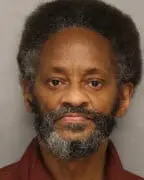
Leroy Thomas was sentenced to death by the State of Pennsylvania for a robbery murder. According to court documents Leroy Thomas who is also known as Larry Rush would commit murder during a robbery. Leroy Thomas would be arrested, convicted and sentenced to death
Leroy Thomas 2022 Information
Parole Number: 0989P
Age: 62
Date of Birth: 12/21/1959
Race/Ethnicity: BLACK
Height: 6′ 00″
Gender: MALE
Citizenship: USA
Complexion: DARK
Current Location: PHOENIX
Leroy Thomas More News
In the afternoon of May 8, 1987, Veranica James Hands had planned to meet her husband and friends at a shopping mall. She did not arrive as planned, so her husband went looking for her. He went to their apartment on the upper two floors of a three-story duplex on Federal Street in Philadelphia. He was surprised to find the door to the building and the door to their apartment unlocked. On the stair landing of the third-floor bedroom, he found his wife’s body, clad in a bathrobe and partially covered with a blanket and pillows. She was eight-and-a-half months pregnant and had been bound, gagged and stabbed to death. She had more than fifty stab wounds, some puncturing vital organs and fatally penetrating her unborn baby.
The third floor of the apartment had been partially ransacked. Pocket change, paper currency, an imitation Rolex watch, Mrs. Hands’ high school ring, gold chain bracelet, other watches, rings and jewelry, and a pair of fingerless sporting gloves were missing from the bedroom. There were no signs of forcible entry into the apartment. A bedroom window was open. Typically, the window was only opened when Mrs. Hands looked out to see who was ringing the doorbell.
Late on the day of the crime, Rush appeared at his acquaintance’s, Jerry McEachin, residence. Rush seemed nervous and scared. He showed McEachin a “MAC” card bearing Mrs. Hands’ name, a high school ring bearing her initials, other jewelry, coins and paper currency, and a pair of fingerless sporting gloves.
Rush repeatedly looked out the window, telling McEachin he was looking to see if the police were after him. Rush said he just stabbed his cousin in her apartment on Federal Street, and he had stabbed a woman in the past. McEachin saw blood on Rush’s shoelaces. Rush explained that he washed the blood from the knife after the stabbing and put it back in its place in the victim’s apartment.
That day, police learned that Rush had been living on the first floor of the building where the victim lived. They went to Rush’s mother’s home, and when Rush approached and saw the police, he fled. The next day, around 2:00 a.m., McEachin saw Rush hiding under a truck in front of McEachin’s home. Rush asked whether any police were in the vicinity. Rush and McEachin then tried to use Mrs. Hands’ MAC card, and they visited several jewelers to sell some of her jewelry. Later, Rush threw his shoes in a dumpster and told McEachin he hoped he had not left any bloodstains or footprints at the crime scene.
Police recovered the jewelry Rush sold and identified it as belonging to Mrs. Hands. Rush’s fingerprints were found on containers where Mrs. Hands kept her pocket change in her bedroom. Rush’s thumbprint was found in blood on a doorjamb by Mrs. Hands’ body.
Harold James, a former police officer, was the victim’s father and Rush’s second cousin. At trial, he testified that after he learned of his daughter’s murder, he visited the crime scene. He then went to the police station to speak to a homicide detective. While waiting, he encountered Aaron Pringle, who lived in the first-floor apartment of Mrs. Hands’ building. Pringle told James that Rush had also been living on the first floor. James spoke with a detective and told him that Rush should be the prime suspect. James’ testimony contained no reference to Pringle saying anything incriminating about Rush.
A police officer testified that when Rush was arrested, he was found hiding behind some clothes in a closet at the home of one of his friends. Rush did not know that the arrest was for a different crime. At trial, to counter the impression that Rush was hiding from the police because he was guilty of killing Mrs. Hands, defense counsel asked the officer what crime he was there to arrest Rush for, and the officer responded that it was for stabbing a lady in a bookstore on Germantown Avenue. Rush had instructed his counsel to elicit this testimony and insisted that he do so. Defense counsel brought this to the attention of the court out of concern for the effect on the jury of evidence of an extraneous crime. The court instructed counsel to proceed on Rush’s directive. Rush was convicted and sentenced to death.